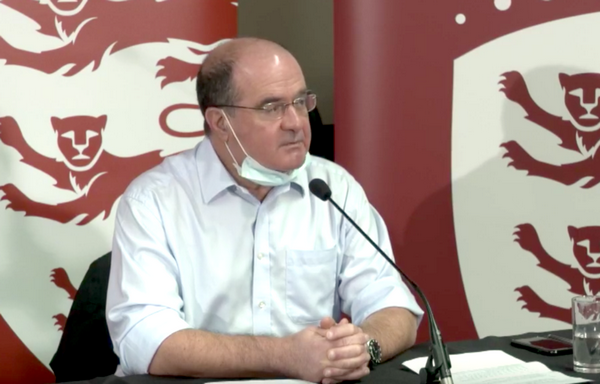


Last week, the medic leading Jersey's response to the pandemic was asked whether he thought the island should be pursuing an ‘elimination strategy’. Dr Muscat blustered.
He replied to the question without answering it, as skilfully as any politician would. The irony is that Dr Muscat was probably aiming not to appear political.
Senior civil servants are restricted under law from speaking about ‘political matters’ unless they are classified as ‘politically eligible’. There is little public information to whom the public sector’s statutory employer, the States Employment Board (SEB), has given special dispensation.
Whether the content an employee’s employment contracts might contradict any apparent dispensation is a different and private matter.
So, why gag employees in this way in the first place?

Pictured: "The irony is the Chief Medical Officer probably was aiming not to appear political."
Partly to protect them from becoming embroiled in political spats, perhaps. Dr Muscat advises on matters within his field of expertise as Deputy Medical Officer for Health. People like the Minister for Economic Development may have been advised to resist restrictions on flights and hospitality businesses recommended by government employees on its Scientific Technical and Advisory Committee (STAC).
What knowledge do they have of the content and quality of any information supplied to this Minister in his ‘field of expertise’ (particularly if supporting data and modelling information have not been published)?
The restriction might also be argued to protect government from appearing to employ employees who are politically biased and partisan. This hardly stops government employees from being ‘politically biased’ behind the scenes, though. If they have such a bias, shouldn’t the public know about it?
Gagging speech and opinions on ‘political matters’ also could be used as a form of control, to prevent the making of objective comments that could put government in a poor light.

Pictured: "What if a government employee has a statutory responsibility to comment on data produced by government (like the Chief Statistician, for example)?"
What if a government employee has a statutory responsibility to comment on data produced by government (like the Chief Statistician, for example)? That employee may be bound by a Code of Conduct requiring him to be impartial and to apply globally accepted standards in forming his professional opinion.
He may have professional integrity. But if he pointed out a flaw in a public survey carried out by government, that supported a political stance, could he be regarded as being ‘political’?
Government has a role in creating society so nearly anything in society could be regarded as a ‘political matter’. And freedom of expression is a human right.
The restriction on freedom of expression imposed by law on certain government employees is broader than the exceptions contemplated by Jersey’s human rights law. Should protecting ‘the reputation or rights of others’ reasonably be interpreted as extending to government itself?
Throwing bureaucratic and legal obstacles in the way of those who could be a source of criticism, challenge or exposure of government activities needs to be carefully reviewed by the States Members on the SEB, along with other strictures on government employees, for the sake of democracy.
Because gagging sources of information is a step away from gagging the press.